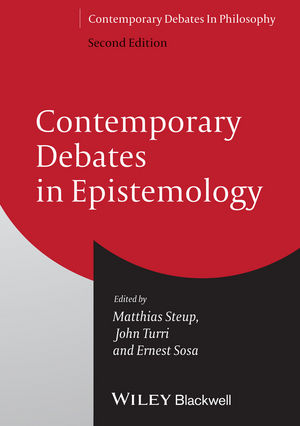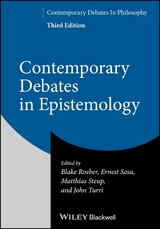
Contemporary Debates in Epistemology
Wiley-Blackwell (Verlag)
978-0-470-67209-9 (ISBN)
- Titel erscheint in neuer Auflage
- Artikel merken
Second edition of a highly influential text that has already become a standard in the field, for students and professional researchers alike, due to its impressive line-up of contributors, and its unique combination of accessibility and originality
Twenty-six essays in total, covering 13 essential topics
Features five new topics that bring readers up to speed on some of the latest developments in the field, and give them a glimpse of where it's headed: Should knowledge come first? Do practical matters affect whether you know? Is virtuous motivation essential to knowing? Can knowledge be lucky? Can evidence be permissive?
Substantially updates two other debates: Is there immediate justification? Can belief be justified through coherence alone?
Matthias Steup is Professor of Philosophy at Purdue University, USA, where he is head of the Department of Philosophy. A specialist in epistemology, he is a widely published author and editor. Previous work includes A Companion to Epistemology (co-edited with Jonathan Dancy and Ernest Sosa, Wiley-Blackwell, 2010, second edition), the first edition of Contemporary Debates in Epistemology (co-edited with Ernest Sosa, Wiley-Blackwell, 2005), and Knowledge, Truth and Duty (2001). John Turri is Assistant Professor of Philosophy at the University of Waterloo, Canada. A specialist in epistemology and the philosophy of language, he has published dozens of articles on these topics in leading journals such as Philosophical Review, Noûs, Philosophy and Phenomenological Research, Analysis, and Philosophical Studies. He currently holds an Early Researcher Award from the Ontario Ministry of Economic Development and Innovation. Ernest Sosa is Board of Governors Professor of Philosophy at Rutgers University, USA. He has published books and articles in epistemology, including Knowledge in Perspective (1991), Epistemic Justification (with Laurence BonJour, Blackwell, 2003), A Virtue Epistemology (2007), Reflective Knowledge (2009), and Knowing Full Well (2011).
Notes on Contributors viii Preface to the Second Edition xiii
Preface to the First Edition xiv
1 Should Knowledge Come First? 1
Knowledge First Timothy Williamson 1
What Is Knowledge-first Epistemology? Trent Dougherty and Patrick Rysiew 10
Experience First Trent Dougherty and Patrick Rysiew 17
Knowledge Still First Timothy Williamson 22
Still Nowhere Else to Start Trent Dougherty and Patrick Rysiew 25
2 Is Knowledge Closed under Known Entailment? 27
The Case against Closure Fred Dretske 27
The Case for Closure John Hawthorne 40
Reply to Hawthorne Fred Dretske 56
3 Is Knowledge Contextual? 60
Contextualism Contested Earl Conee 60
Contextualism Defended Stewart Cohen 69
Contextualism Contested Some More Earl Conee 75
Contextualism Defended Some More Stewart Cohen 79
4 Do Practical Matters Affect Whether You Know? 84
Practical Matters Affect Whether You Know Jeremy Fantl and Matthew McGrath 84
Practical Matters Do Not Affect Whether You Know Baron Reed 95
5 Can Skepticism Be Refuted? 107
The Refutation of Skepticism Jonathan Vogel 108
The Challenge of Refuting Skepticism Richard Fumerton 120
6 Are Intellectually Virtuous Motives Essential to Knowledge? 133
Knowledge Need Not Be Virtuously Motivated Jason Baehr 133
Knowledge and the Motive for Truth Linda Zagzebski 140
Reply to Zagzebski Jason Baehr 146
Reply to Baehr Linda Zagzebski 149
7 Can Knowledge Be Lucky? 152
Knowledge Cannot Be Lucky Duncan Pritchard 152
Knowledge Can Be Lucky Stephen Hetherington 164
8 Is There a Priori Knowledge? 177
In Defense of the a Priori Laurence BonJour 177
There Is No a Priori Michael Devitt 185
Reply to Devitt Laurence BonJour 195
Reply to BonJour Michael Devitt 197
Last Rejoinder Laurence BonJour 200
9 Is There Immediate Justification? 202
There Is Immediate Justification James Pryor 202
There Is no Immediate Justification Juan Comesaña 222
Reply to Comesaña James Pryor 235
Reply to Pryor Juan Comesaña 239
10 Can Belief Be Justified Through Coherence Alone? 244
Non-foundationalist Epistemology: Holism, Coherence, and Tenability Catherine Z. Elgin 244
Why Coherence Is Not Enough: A Defense of Moderate Foundationalism James Van Cleve 255
Reply to Van Cleve Catherine Z. Elgin 267
Reply to Elgin James Van Cleve 271
11 Is Infinitism the Solution to the Regress Problem? 274
Infinitism Is the Solution to the Regress Problem Peter Klein 274
Infinitism Is Not the Solution to the Regress Problem Carl Ginet 283
Reply to Ginet Peter Klein 291
Reply to Klein Carl Ginet 295
12 Can Evidence Be Permissive? 298
Evidence Can Be Permissive Thomas Kelly 298
Evidence Cannot Be Permissive Roger White 312
13 Is Justification Internal? 324
Justification Is Not Internal John Greco 325
Justification Is Internal Richard Feldman 337
14 Is Truth the Primary Epistemic Goal? 351
Truth Is Not the Primary Epistemic Goal Jonathan L. Kvanvig 352
Truth as the Primary Epistemic Goal: A Working Hypothesis Marian David 363
Index 378
| Reihe/Serie | Contemporary Debates in Philosophy |
|---|---|
| Verlagsort | Hoboken |
| Sprache | englisch |
| Maße | 173 x 244 mm |
| Gewicht | 617 g |
| Themenwelt | Geisteswissenschaften ► Philosophie ► Erkenntnistheorie / Wissenschaftstheorie |
| ISBN-10 | 0-470-67209-9 / 0470672099 |
| ISBN-13 | 978-0-470-67209-9 / 9780470672099 |
| Zustand | Neuware |
| Informationen gemäß Produktsicherheitsverordnung (GPSR) | |
| Haben Sie eine Frage zum Produkt? |
aus dem Bereich


![Was heißt Denken?. Vorlesung Wintersemester 1951/52. [Was bedeutet das alles?] - Martin Heidegger](/media/113619842)
